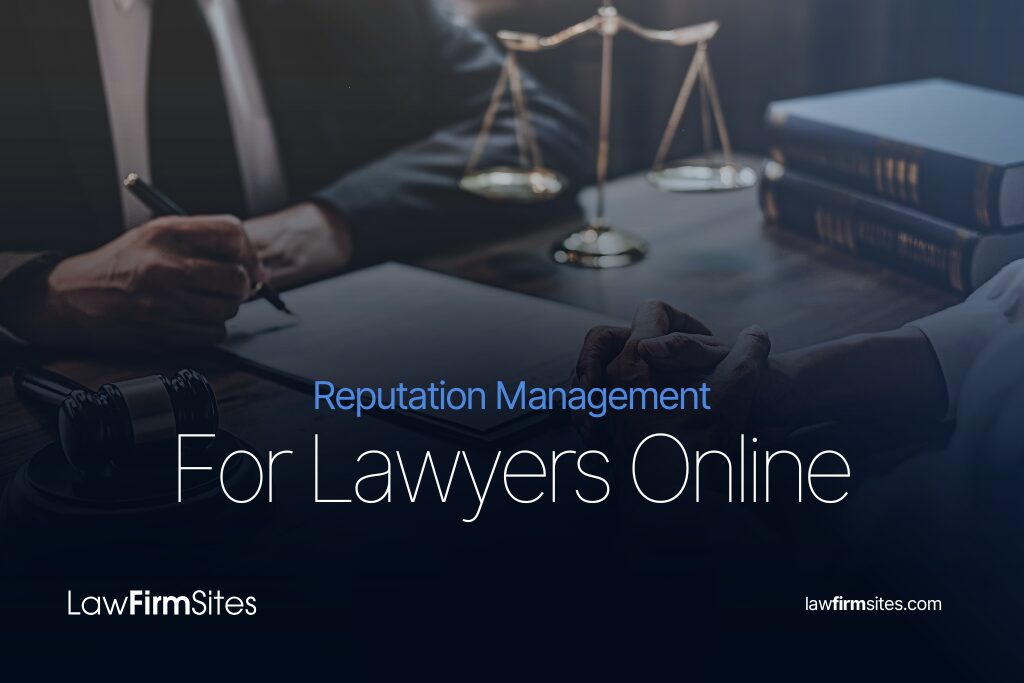Reputation Management for Lawyers Online

Your law firm’s reputation now lives where your clients start their search: online. Prospects read attorney reviews, scroll through social media, and scan news stories before they book a consultation. That means a single page of search results can either earn trust or raise doubts. This guide explains law firm reputation management and practical strategies any firm can use to build credibility, reduce risk, and attract qualified clients.
What Is Law Firm Reputation Management?
Law firm reputation management is the ongoing process of monitoring, shaping, and protecting how your practice is perceived across the internet. It includes review generation and response, search engine optimization for branded queries, Google Business Profile management, social media governance, public relations, and crisis communication planning. The goal is to create a more positive, verifiable proof of client satisfaction and respond to criticism in a way that aligns with professional ethics and privacy rules.
Effective attorney reputation management spans three layers:
Visibility
Ensure accurate, consistent information on your website, GBP, and legal directories so searchers can find the right lawyer, location, and practice areas.
Proof
Collect authentic reviews, case narratives, and media mentions that demonstrate reliability and outcomes, without sharing confidential details.
Risk control
Detect and address negative narratives early, whether they appear in reviews, forums, or news, using clear policies, a measured response, and documented procedures.
Strategies in Reputation Management for Law Firms
Ask for positive reviews and respond to negative ones
Online reviews influence whether a potential client calls your office, and they appear prominently in branded search results. Build a review flow that fits your intake and closing processes:
Map moments to request feedback
Ask satisfied clients for a review shortly after a key milestone, such as a resolved matter or successful mediation. Provide simple instructions for Google, Avvo, or Yelp, whichever platforms fit your practice and audience. Disclose that reviews are voluntary, and never offer incentives.
Use compliant templates
Keep requests short: thank the client, explain that feedback helps others, and share the direct link. Include a reminder not to disclose private facts in public reviews.
Respond to all reviews with care
For positive reviews, thank the reviewer without revealing any details. For critical reviews, acknowledge the feedback, keep the response brief and professional, and invite offline follow‑up through a general firm channel. Do not argue facts online or reveal client information.
Escalate when needed
If a review violates platform rules, such as hate speech, explicit content, or personal information, flag it through the platform’s process and keep a record of evidence.
Writing review responses that build trust
Respond promptly but thoughtfully, ideally within 24 to 72 hours—so the reviewer feels heard without rushing your reply. Keep your language neutral and respectful, avoiding legalistic phrasing that can sound defensive. Safeguard confidentiality by omitting case details and speaking in general terms (for example, “We take feedback seriously and will reach out through our usual channels”). After posting your response, close the loop internally: verify what happened, address the issue where possible, and update your process playbook to reduce the chance of repeat problems.
Use the power of social media to establish a reputation
Social platforms are where prospective clients and referral sources gauge professionalism and values. Treat social media for lawyers as an owned newsfeed for proof points, not only promotions.
Other important notes
Reputation work in law is unlike other industries because legal ethics and client confidentiality come first. Here are a few guardrails to keep in mind:
Confidentiality by default: Never reveal client identities or case details in replies or posts unless you have written permission and the disclosure complies with your jurisdiction’s rules.
Advertising and endorsements: Ensure that testimonials and case narratives meet your state’s attorney advertising standards. Disclose material connections in any endorsements.
Recordkeeping: Keep copies of reviews, responses, takedown requests, and platform decisions. Document your internal process for audits or bar inquiries.
How to build a lightweight legal PR engine?
Public relations amplifies credibility through third‑party validation. When your attorneys appear in reputable media, give quotes on timely legal questions, or publish op‑eds that clarify emerging issues, you earn signals that reinforce trust across search and social.
Own your newsroom
Add a “News & Insights” page with press‑ready bios, headshots, areas of focus, and a concise firm description. Keep it updated so journalists can verify details quickly.
Proactive outreach: Pitch case‑independent, educational angles (e.g., implications of a new statute) to legal industry publications or local media. Offer clear, non‑partisan explanations.
Leverage thought leadership responsibly: Publish data‑driven explainers on your blog and repurpose them as bylines. Cite statutes, court rules, and government data; avoid discussing active matters.
Crisis communication plan: Draft holding statements for foreseeable issues (e.g., a public complaint or misreporting). Establish an approval path so you can respond swiftly while maintaining accuracy and confidentiality.
Secure your reputation using the right legal marketing mindset
Law firm reputation management is not a one‑time task; it is a sustained system for visibility, proof, and risk control. By asking satisfied clients for honest reviews, replying to criticism with restraint and privacy in mind, investing in social content that educates, and reinforcing your message through measured PR, your firm builds credibility that compounds over time.
Law Firm Sites has resources if you want practical checklists, examples, and implementation guidance without sales fluff to help you put these steps into action.
Did you like this post? Here are some others you might enjoy:

For most law firms, growth depends on being visible at the exact moment a potential client searches for help. Pay‑per‑click…

Strong legal marketing rewards depth. When potential clients face high-stakes decisions, they search for thorough, trustworthy guidance that clearly explains…

Data is the most reliable guide for growing a law firm website because it shows what clients actually search, where…

